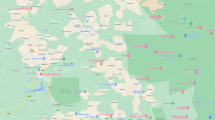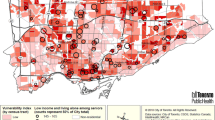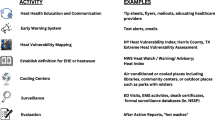Abstract
Objectives
Since 2004, the Montreal heat response plan (MHRP) has been developed and implemented on the Island of Montreal to reduce heat-related health effects in the general population. In this paper, we aimed to assess the barriers and facilitators to implementation of the MHRP and evaluate the awareness of key elements of the plan by healthcare professionals and individuals from vulnerable populations.
Methods
Data were gathered from monitoring reports and a questionnaire administered to managers of healthcare institutions and healthcare workers in Montreal-area health and social services institutions. Individual interviews and focus groups with healthcare workers and with individuals with schizophrenia or suffering from drug or alcohol dependencies were performed. Data were categorized according to predefined subthemes. Coding matrices were then used to determine the most frequently occurring elements in the subthemes.
Results
Our results indicate that actions are progressively implemented each year in the healthcare network. Intensification of surveillance for signs of heat-related illness is the most frequently reported measure. Identification and prioritization of clientele and homecare patients are identified as a challenge, as is ensuring the availability of sufficient personnel during a heat wave. Analysis of practice and awareness in healthcare professionals reveals that preventive measures are known and applied by the personnel. Individuals from vulnerable population groups were not uniformly aware of preventive measures, and consequently, variability was observed in their application.
Conclusion
The framework proposed in this study revealed valuable information that can be useful to improve plans aimed at reducing heat-related health effects in the population.
Résumé
Objectifs
Le Plan chaleur accablante ou extrême a été développé et mis en œuvre sur l’Île de Montréal depuis 2004 dans le but d’atténuer les effets sur la santé en lien avec la chaleur chez la population générale. Cet article dresse un portrait des éléments facilitateurs et des défis rencontrés lors de la mise en œuvre du plan chaleur. L’article présente également une évaluation de la connaissance des professionnels de la santé et de la population vulnérable quant à certains éléments-clés du plan chaleur.
Méthodes
L’information a été recueillie à l’aide de rapports de suivi et à l’aide d’un questionnaire administré aux gestionnaires et aux professionnels de la santé œuvrant dans les institutions de santé et de services sociaux sur l’Île de Montréal. De plus, des entrevues individuelles et des groupes de discussion ont été réalisés auprès de travailleurs de la santé et auprès d’individus vivant avec la schizophrénie ou ayant des dépendances aux drogues ou à l’alcool. L’information recueillie a été catégorisée selon des thèmes prédéfinis et les éléments les plus fréquents ont été identifiés à l’aide de matrices.
Résultats
L’analyse des résultats permet de constater la mise en œuvre graduelle des mesures de prévention lors d’épisodes de chaleur. La surveillance accrue des signes et symptômes des effets de la chaleur est la mesure la plus souvent mentionnée dans l’information recueillie. Les principaux défis soulignés sont l’identification et la priorisation de la clientèle et des patients à domicile ainsi que s’assurer d’un personnel suffisant lors d’un épisode de chaleur extrême. Les résultats indiquent que les travailleurs de la santé connaissent et appliquent les mesures de prévention. Quant aux résultats ayant trait aux populations plus vulnérables, l’information sur les mesures de prévention n’était pas connue de tous et conséquemment, l’application efficace de ces mesures n’était pas observée dans tous les groupes.
Conclusion
Cet article propose une méthodologie pouvant être applicable à l’amélioration des plans de réponse pour la chaleur extrême, visant ainsi la réduction des effets de la chaleur chez la population.


Similar content being viewed by others
Notes
Montreal Public Health department is a part of the Centre intégré universitaire de santé et de services sociaux (CIUSSS) du Centre-Sud-de-l’Île-de-Montréal.
References
Abrahamson, V., Wolf, J., Lorenzoni, I., Fenn, B., Kovats, S., Wilkinson, P., Adger, W. N., & Raine, R. (2009). Perceptions of heatwave risks to heats: Interview based study of older people in London and Norwich. UK Journal of Public Health, 31(1), 119–126.
Agence de la santé et des services sociaux de Montréal (ASSSM) (2012). Chaleur accablante ou extrême 2012 - Plan régional de prévention et de protection et Guide à l’intention des établissements de santé. (Montréal, QC). Available at: https://publications.santemontreal.qc.ca/uploads/tx_asssmpublications/Plan_CHALEUR_ACC_ET_EXTREME_final.pdf.
Agence de la santé et des services sociaux de Montréal (ASSSM). (2014) Chaleur Accablante Ou Extrême 2014- Plan Régional De Prévention Et De Protection, (Montréal, QC).
Bassil, K. L., & Cole, D. C. (2013). Effectiveness of public health interventions in reducing morbidity and mortality during heat episodes: A structured review. International Journal of Environmental Research and Public Health, 7(3), 991–1001.
Benmarhnia, T., Sottile, M. F., Plante, C., Brand, A., Casati, B., Fournier, M., & Smargiassi, A. (2014). Variability in temperature-related mortality projections under climate change. Environmental Health Perspectives, 122(12), 1293.
Benmarhnia, T., Bailey, Z., Kaiser, D., Auger, N., King, N., & Kaufman, J. S. (2016). A difference-in-differences approach to assess the effect of a heat action plan on heat-related mortality, and differences in effectiveness according to sex, age, and socioeconomic status (Montreal, Quebec). Environmental Health Perspectives, 124(11), 1694–1699.
Black, D. A., Veitch, C., Wilson, L. A., & Hansen, A. (2013). Heat-ready: heatwave awareness, preparedness and adaptive capacity in aged care facilities in three Australian states: New South Wales, Queensland and South Australia. Australian Journal of Entomology, 50, 344–355.
Damschroder, L. J., Aron, D. C., Keith, R. E., Kirsh, S. R., Alexander, J. A., & Lowery, J. C. (2009). Fostering implementation of health services research findings into practice: a consolidated framework for advancing implementation science. Implementation Science, 4, 50.
Gasparrini, A., & Armstrong, B. (2011). The impact of heat waves on mortality. Epidemiology, 22(1), 68.
Gosselin, C., Kosatsky, T., Fournier, M., Richard, L., Pinard, M., King, N., Bonney, D., Gaudet, J. (2009). Évaluation de la campagne d'éducation sur les risques à la santé reliés aux épisodes de chaleur accablante et sur les mesures à prendre pour se protéger. Rapport détaillé. (Montréal, QC: Direction de santé publique de l’Agence de la santé et des services sociaux de Montréal, 58 pages).
Kunst, A. E., & Britstra, R. (2013). Implementation evaluation of the Dutch National Heat Plan among long-term care institutions in Amsterdam: a cross-sectional study. BMC Health Services Research, 13, 135.
Lowe, D., Ebi, K. L., & Forsberg, B. (2011). Heatwave early warning systems and adaptation advice to reduce human health consequences of heatwaves. International journal of Environmental Research and Public Health, 8(12), 4623–4648.
Price, K., Perron, S., & King, N. (2013). Implementation of the Montreal heat response plan during the 2010 heat wave. Canadian Journal of Public Health, 104, e96–100.
Roy, L. A., Price, K., Pâquet, M., Perron, S., Vida, S., Sénécal, G., Lefebvre, L., & King, N. (2011). Canicule 2010 À Montréal - Rapport Du Directeur De Santé Publique. Montréal: Direction de santé publique de l’Agence de la santé et des services sociaux de Montréal.
Toloo, G., FitzGerald, G., Aitken, P., Verrall, K., & Tong, S. (2013). Evaluating the effectiveness of heat warning systems: systematic review of epidemiological evidence. International Journal of Public Health, 58, 667–681.
White-Newsome, J. L., Ekwurzel, B., Baer-Schultz, M., Ebi, K. L., O’Neill, M. S., & Anderson, G. B. (2014). Survey of county-level heat preparedness and response to the 2011 summer heat in 30 US states. Environmental Health Perspectives, 122(6), 573.
World Health Organization (WHO), World Meteorological Organization (2015). Heatwaves and health: guidance on warning-system development. G.r. Mcgregor, lead editor, P. Bessemoulin, k. Ebi and b. Menne, editors (96 pages).
Author information
Authors and Affiliations
Corresponding author
Ethics declarations
Conflict of interest
The authors declare that they have no conflict of interest.
Rights and permissions
About this article
Cite this article
Price, K., Benmarhnia, T., Gaudet, J. et al. The Montreal heat response plan: evaluation of its implementation towards healthcare professionals and vulnerable populations. Can J Public Health 109, 108–116 (2018). https://doi.org/10.17269/s41997-018-0020-2
Received:
Accepted:
Published:
Issue Date:
DOI: https://doi.org/10.17269/s41997-018-0020-2




